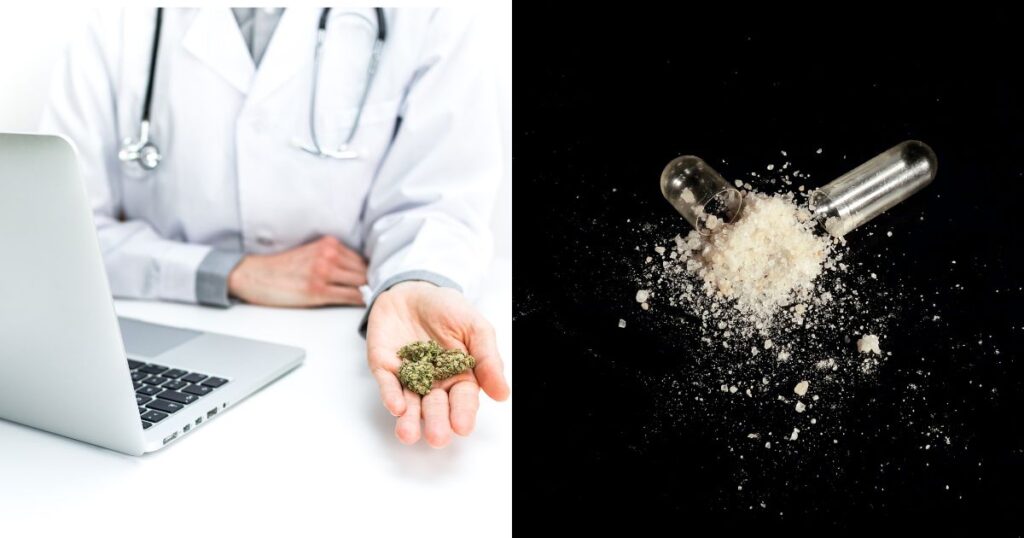For too long, America’s military veterans have been denied access to alternative therapies that could genuinely enhance their healing journeys. That, however, may soon change. The U.S. House of Representatives is set to vote on amendments to H.R. 3944, the Military Construction, Veterans Affairs, and Related Agencies Appropriations Act. These amendments could profoundly impact healthcare options for veterans, specifically regarding medical marijuana and MDMA-assisted therapy.
The Limits of Current Veteran Healthcare and Medical Marijuana
Currently, veterans receiving care through the Department of Veterans Affairs (VA) are restricted in what they can discuss and access regarding alternative treatments. Even in states where medical marijuana is legal, a VA directive (Veterans Health Directive 1315) prohibits VA doctors from recommending cannabis or even helping veterans register for state-approved marijuana programs.
This leaves many veterans without a trusted medical advisor to guide them on the risks and benefits of choosing cannabis as a treatment route.
Instead, many veterans find themselves reliant on heavy narcotics, such as opioids, to manage pain, post-traumatic stress disorder (PTSD), and other service-related illnesses. The consequences of this dependence are well-known, ranging from debilitating side effects to a higher risk of addiction.
According to veteran advocates, this reliance on conventional pharmaceuticals is driving thousands of veterans into crises, including suicide. Every day, an estimated 20 veterans take their own lives.
The limitations of the VA’s current approach highlight a critical issue: veterans deserve access to alternative treatments, including cannabis and psychedelic-assisted therapies, within the same trusted healthcare framework as traditional medicine.
What the Proposed Amendments For Medical Marijuana and MDMA-Assisted Therapy Seek to Change for Veterans
Two key amendments to H.R. 3944, brought forward by bipartisan lawmakers, Reps. Brian Mast (R-FL) and Reps. Lou Correa (D-CA) in a recent rules committee hearing, would address these gaps in veteran care.
- Medical Marijuana Access: Reps. Brian Mast (R-FL) testified for Amendment 84, this amendment would prevent the VA from enforcing its current prohibition on recommending or assisting veterans with state medical marijuana programs.
Removing these barriers would allow veterans to have honest conversations with their VA doctors about the potential therapeutic benefits of cannabis and receive the guidance they need to make informed decisions in states where marijuana is legal. - Psychedelic-Assisted Therapy Research: A separate amendment from Reps. Lou Correa (D-CA) pushes for expanded research into the use of psychedelics like MDMA for treating PTSD and substance use disorders. Studies of MDMA-assisted therapy have shown significant promise in helping individuals with treatment-resistant PTSD.
If enacted, Amendment would require the VA to assess and recommend infrastructure changes needed to integrate approved psychedelic therapies into care for conditions like PTSD and substance use disorders.
Together, these amendments aim to pave the way for veterans to access medically supervised alternatives that could radically improve their quality of life.
Why These Amendments Matter
Veterans like Representative Brian Mast (R-FL), who co-sponsored the cannabis proposal, know firsthand how vital these changes could be. Mast, an Afghanistan war veteran who lost both legs and a finger from wartime injuries, shared his experience of waking up at Walter Reed hospital to find himself on a staggering list of narcotics. Reflecting on the struggles many veterans face, he emphasized, “It would be much better if they look into that path under the directive of their doctor.”
You can see Reps Brian Mast (R-FL) and Lou Correa (D-CA), talka bout their proposed amendments at the 2:41:43 mark in the above YouTube video.
Supporters of psychedelic therapy, like Representative Lou Correa (D-CA), frame the issue as an urgent moral imperative in a recent press release. “We lose up to 20 veterans a day to suicide. One is too many,” Correa stated. Allowing the VA to explore MDMA-assisted therapy could combat the “invisible wounds” veterans face, ranging from PTSD to substance dependency.
The potential of these amendments lies not only in their ability to expand treatment options but also in their capacity to foster trust and transparency between veterans and their healthcare providers. By enabling open dialogue about medical marijuana and psychedelics under professional guidance, the VA could create safer, more effective treatment pathways for military service members transitioning into civilian life.
Moving Forward
H.R. 3944 and its associated amendments represent an important moment for veteran healthcare in the United States. These legislative changes offer hope for those who have long felt left behind by a rigid system that fails to recognize the need for alternative treatments.
Veterans dedicate their lives to protecting this country; they deserve nothing less than full access to all viable healthcare solutions. Whether it’s providing a safer pain management option through medical marijuana or helping veterans with PTSD reclaim their lives through psychedelic treatment options, these amendments could be a step in the right direction toward comprehensive veteran care.
Stay tuned as the House prepares to vote on H.R. 3944 later this week. Legislative action will determine if these measures make it into law.

















